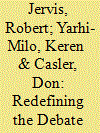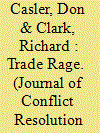| Srl | Item |
| 1 |
ID:
192024


|
|
|
|
|
| Summary/Abstract |
The conventional wisdom in international relations holds that an actor’s past record of keeping her word determines her cooperative credibility, and that mutual perceptions of credibility are essential in sustaining cooperation. Yet competing reputation-skeptic and psychological perspectives dispute this conventional wisdom, suggesting that assessments of cooperative credibility result from observers’ judgments about the other’s capabilities and interests or observers’ foreign policy orientations. How do observers assess others’ cooperative credibility? We field a nationally representative survey experiment asking 2,953 Americans to evaluate a hypothetical coercer’s commitment to lift sanctions on a would-be proliferator in exchange for the latter dismantling its nascent nuclear program. We vary the coercer’s previous behavior plus several other contextual factors. We find that respondents’ hawkishness interacts with the coercer’s past actions to shape respondents’ credibility assessments and their support for the proliferator accepting the proposal, with substantial implications for theories of misperception and bargaining.
|
|
|
|
|
|
|
|
|
|
|
|
|
|
|
|
| 2 |
ID:
179163


|
|
|
|
|
| Summary/Abstract |
A wave of recent scholarship has breathed new life into the study of reputation and credibility in international politics. In this review article, the authors welcome this development while offering a framework for evaluating collective progress, a series of related critiques, and a set of suggestions for future research. The article details how the books under review represent an important step toward consensus on the importance of reputation in world politics, elucidating scope conditions for when reputational inferences are likely to be most salient. The authors argue that despite the significant accomplishments of recent studies, the scholarly record remains thin on the psychology of the perceiver and is instead focused on situational factors at the expense of dispositional variables and is rather myopically oriented toward reputation for resolve to the exclusion of other important types. Despite its contributions, the new literature still falls short of a full explanation for how actors draw inferences about reputation. These remaining theoretical challenges demand scholarly attention and suggest a role for psychology in filling some of the gaps.
|
|
|
|
|
|
|
|
|
|
|
|
|
|
|
|
| 3 |
ID:
180223


|
|
|
|
|
| Summary/Abstract |
Politicians frequently issue public threats to manipulate tariffs but only sometimes follow through. This behavior theoretically ought to generate audience costs. We therefore test the validity of audience costs in trade war settings through a vignette-based survey experiment. The vignettes describe a hypothetical situation involving the U.S. and a second country (China, Canada, or unspecified) with whom the U.S. has a trade deficit. The president (Democrat, Republican, or unspecified) either maintains the status quo, threatens to impose tariffs and backs down, or threatens to impose tariffs and follows through. Our findings highlight differences between security and trade conflict when it comes to audience costs and presidential approval. While Americans sanction the president for issuing a threat to raise tariffs, they generally support backing down. Regression modeling and text analysis of a free response question from our surveys suggest this is because consumers are wary of paying the costs of tariffs.
|
|
|
|
|
|
|
|
|
|
|
|
|
|
|
|